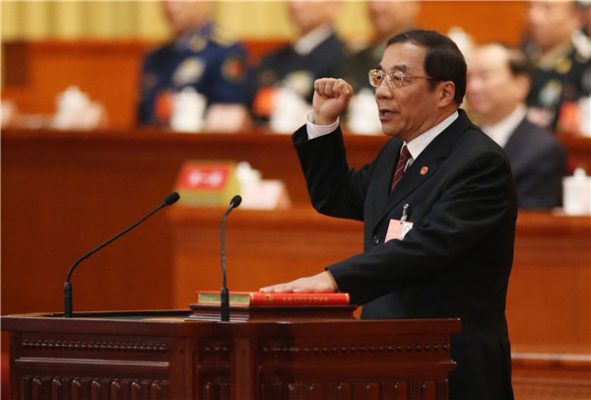
A senior graft-buster was elected by the top legislature to lead China’s new National Supervisory Commission, marking a key step in the country’s sweeping reform toward building a more centralized oversight system.
Yang Xiaodu, deputy secretary of the Central Commission for Discipline Inspection of the Communist Party of China, was elected director of the National Supervisory Commission on Sunday during the ongoing session of the 13th National People’s Congress.
He took the oath of allegiance to the country’s Constitution after being elected.
Yang, born in 1953, is a member of the Political Bureau of the CPC Central Committee. He had headed the Ministry of Supervision and the National Bureau of Corruption Prevention until an institutional restructuring plan of the State Council, which was adopted on Saturday, merged the two agencies to form the National Supervisory Commission.
As the first director of the commission — the national agency of a new anti-graft and supervisory network that was endorsed by constitutional amendment a few days ago — Yang is expected to play an important role in pushing forward the country’s reform.
The revised Constitution, adopted by the 13th NPC on March 11, first listed supervisory commissions as a new type of State organ. As the supreme supervisory organ, the National Supervisory Commission will oversee local commissions.
The country’s first law on supervision is being deliberated by lawmakers and will be put to a vote on Tuesday.
The law, an essential part of China’s reform of supervisory institutions, is expected to serve as a fundamental and guiding law against corruption and for State supervision, Li Jianguo, vice-chairman of the Standing Committee of the 12th NPC, said when explaining the draft to the top legislature last week.
The draft law incorporates practices of the pilot reform of the supervisory system, which began in Beijing and Shanxi and Zhejiang provinces in December 2016 and was expanded nationwide in November. Supervisory commissions have been established at the provincial, city and county levels across the country.
Under the old supervisory system, the Party disciplinary network oversaw all Party members, while administrative supervisory agencies governed civil servants, which left a considerable number of State functionaries unsupervised. As the reform unfolds, supervisory commissions will be entitled to oversee the staffs of Party organs, legislatures, governments, courts, procuratorates and political advisory bodies, as well as executives of State-owned enterprises and the managing staffs of public institutions, among others.
Sharing offices and staff with Party disciplinary inspectors, the new supervisory commissions incorporate existing supervisory, corruption prevention and control agencies within governments and procuratorates, pooling anti-graft resources.
The new supervision system and the law on national supervision highlight the unified leadership of the CPC and the principle of the rule of law in fighting corruption, said Guo Yingguang, an NPC deputy and deputy director of the Standing Committee of the Shanxi People’s Congress.
He said the pilot program in Shanxi has provided experience and a practical basis for the reform, and it’s the right time to adopt such a law to carry forward the country’s ongoing anti-corruption campaign.


